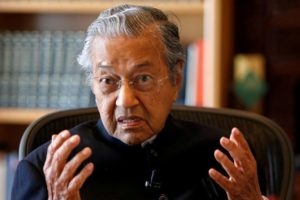As a rule, I ignore unsolicited suggestions for my commentaries. Family and friends would attest to this. I honestly cannot remember the last time I made an exception. But I am doing so today.
From time to time, my twentysomething niece Emily shares video clips of her so-called life. But none of them has ever been remotely political.
 This is why I was so surprised a few days ago when she shared a clip of Malaysian Prime Minister Mahathir Mohamad. It featured him explaining his objection to China’s adhesive terms for investing in developing nations. Here is what he said:
This is why I was so surprised a few days ago when she shared a clip of Malaysian Prime Minister Mahathir Mohamad. It featured him explaining his objection to China’s adhesive terms for investing in developing nations. Here is what he said:
We welcome foreign direct investment [but] when it involves giving contracts to China, borrowing huge sums of money from China, and the contract goes to China, and China contractors prefer to use their own workers from China, use everything imported from China, even the payment is not made here, it’s made in China … that kind of contract is not something that I welcome.
(The South China Morning Post, June 20, 2018)
Emily found this “inspiring and so patriotic.” No doubt because it stands in instructive contrast to the humiliating way political leaders in the Caribbean (where she lives) devour Chinese foreign direct investments like manna from Heaven.
She wanted to know what I thought. I was heartened: far more by her interest in Mahathir’s explanation, mind you, than by her interest in my thoughts. Emily is, after all, of a generation for whom #MeToo could easily refer to getting the latest photo-editing and filter app for Instagram.
Suffice it to know that we had a terrific discussion on this topic last weekend. Nothing indicates how much we enjoyed it quite like our mutual agreement to take it from texting on WhatsApp to talking on iPhones.
But it only occurred to me last night that I never mentioned that Mahathir’s explanation actually echoed what I’ve been writing for over a decade. I suspect I was too busy trying to cull, challenge, and channel her thoughts. And it was self-evident that she is not among my regular readers. This, however, did not give her any pause about suggesting I write about Mahathir.
I demurred. But upon reflection, I felt obliged – if only to share my delight in the interest she showed in this topic.
As it happens, though, I could have shared links to many commentaries in which I previewed Mahathir’s take on China. Most notable would have been a link to “China Putting Squeeze on The Bahamas. Your Country Could Be Next,” October 22, 2010, which includes the following excerpt on point.
____________________
The Bahamas is having a precedent-setting dispute with China over a development agreement, which calls for Chinese men to compose the vast majority of workers on a $2.5 billion project (Baha Mar) that China is funding. …
China is demanding that this small Caribbean nation issue permits for 8,150 Chinese workers (a.k.a. soldiers), which would amount to 71% of the labor force needed for this project; notwithstanding that The Bahamas is teeming with unemployed men (and women) who are willing and able to do the work.
Of course, for over a decade now, China has been buying up influence throughout the Caribbean to enable it to exercise its economic, political, and, perhaps, even military power to further its national interests without question … let alone challenge. And nothing demonstrated its modus operandi in this respect quite like the way it allegedly bribed (or attempted to bribe) every nation in the region to sever ties with Taiwan: almost all of them, including The Bahamas, duly complied.
But the leaders of every one of these nations knew, or should have known, that, sooner or later, China would seek to use its influence in ways that were inimical to their national interests. And, lest anyone thinks I’m making too much of this, bear in mind that I had just cause to sound the alarm earlier this year in ‘World Beware: China Calling in (Loan-Sharking) Debts,’ February 19, 2010.
There’s no gainsaying the principle at issue; namely, that no matter the developer or financier, the percentage of local to foreign workers on all development projects should be at least 70:30; i.e., in favor of local workers, not the other way around.
____________________
By the way, China is accusing Mahathir of “anti-China bias.” But this gaslighting is rather like Britain accusing Kwame Nkrumah of anti-Britain bias for objecting to the mercantile way it exploited Ghana and other African colonies.
After all, China is blithely doing today what Britain did during the halcyon days of colonialism. Unfortunately, nobody is standing up for African (or Caribbean) countries today the way Nkrumah did back then (or the way Mahathir is standing up for Malaysia today).
 That said, I’d be remiss not to share a little of this less inspiring aspect of Mahathir’s leadership:
That said, I’d be remiss not to share a little of this less inspiring aspect of Mahathir’s leadership:
Anwar Ibrahim, the standard-bearer of Malaysia’s reform movement, was released from prison and granted a royal pardon Wednesday in one of the most dramatic developments since an opposition alliance scored a stunning win in national elections last week. …
Anwar served as Mahathir’s deputy and finance minister in the 1990s before falling out with him during the Asian financial crisis, being sacked from the government and forming the Reformasi movement.
Within weeks, Mahathir had him jailed on [trumped-up] charges of sodomy and corruption.
(The Washington Post, May 16, 2018)
I spared Emily this during our chat. But I am loath to champion only strengths in anyone’s leadership.
To be fair, Malaysians expect Mahathir (92) to cede power to Ibrahim (70) in due course. I suspect this will be his way of making amends/restitution.
But there’s no denying the implications of Ibrahim’s return to political leadership. Because his Mandela-like forgiveness and grace not only indicts Mahathir’s treatment of him but also indicates that Malaysia would have been better governed under his leadership.
Related commentaries:
China squeeze…
